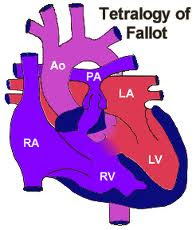 Tetralogy of Fallot
Tetralogy of FallotDefinition
Tetralogy of Fallot is a congenital heart disease with cyanosis, a combination of the four main symptoms are:
- obstruction of the flow out of the right ventricle (pulmonary stenosis),
- ventricular septal defect,
- the position of the right of the aorta and
- right ventricular hypertrophy together form a tetralogy of Fallot.
Clinical manifestations
- cyanosis
- dyspnoea
- dyspnoea attacks paroksimal (blue anoxia attacks)
- delay in growth and development
- normal rate of blood vessels
- systolic murmur
Assessment - Nursing Care Plan for Tetralogy of Fallot
Data that is commonly found in patients with tetralogy of Fallot are:
- thorough cyanosis of mucous membranes or lips, tongue, conjunctiva. Cyanosis also occur at the time of crying, eating, tight, soak in water, can be peripheral or central.
- dyspnoea usually accompanies the activity of eating, crying or tension / stress.
- weakness, commonly in the legs.
- growth and development not in accordance with age.
- digital clubbing
- headache
- epistaxis
Nursing Diagnosis for Tetralogy of Fallot
- Risk for Decreased cardiac output related to structural abnormalities of the heart.
- Activity Intolerance related to imbalance in the fulfillment of oxygen to the body's needs.
- Impaired growth and development related to inadequate oxygenation, tissue nutrisis needs, social isolation.
- Risk for infection related to the general conditions is inadequate.